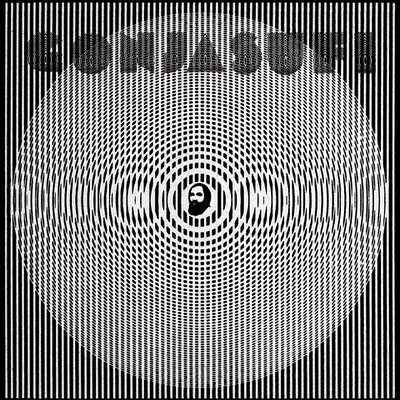Unless you’re creating some sort of abstract noise experiments out of different frequency tape hiss, then you can’t really define yourself genre-wise as lo-fi. Instead it’s more of a quality to the music as opposed to a type of music in itself. And there’s hundreds if not thousands of bands and artists who have made it an actual quality as opposed to artists who work in the medium because they can’t get their hands on better equipment (but then again, they can still make the best out of some cheap microphones and recording to tape).
Whether it’s an actual artistic decision or not to record with crackle and hiss present shouldn’t really matter as admirable qualities should be able to shine through. Or then again, if you’re Gonjasufi, you’ll absorb your voice in a bed of clipping and crackles. But this isn’t in anyway a downfall for him. His voice is worn and ragged, likes a blues singer who’s been performing all night through sweat and alcohol. The music matches; samples torn, ripped and manipulated to create new compositions – often what sounds like samples from old forgotten jazz and funk records with a whole bunch of other bits and pieces thrown into the mix.
But as much as Gonjasufi’s music has quality, it lacks it at the same time. He may well be able to find his way around a sample, but he fails to put anything memorable on top. Often the end result is a song that barely manages to establish a lasting groove but is complete with a distinctive and occasionally indecipherable warble. But you know these miniature pieces have their place and I’m happy to sit through them. “Candylane” doesn’t need time to establish itself because it’s got the funk right there from the start with its noodling guitar and sliding bass. “SuzieQ” condenses spiky guitar and a walking bass breakdown with Gonjasufi’s creaky voice and dissonant afterthoughts all into less than two minutes of playtime. It’s brief, but returning to it is a pleasure when it crops up.
There’s a distinctive difference between the successful attempts at these fleeting moments and those that don’t hit the mark. The likes of “Kowboyz&Indians” has got the hypnotic foreign backdrop, but the problem is that Gonjasufi forgot to write any actual lyrics for the song and instead he spends the first half of the song repeating the song title like it actually means something. But then again, when he does get down to writing clear lyrics, the results don’t exactly shine, despite how clear he might sing them through his microphone. On “”Advice” he suggests, “Take your own advice/ because it’s your own advice.” I don’t care if that has significant meaning to him personally – perhaps a life lesson he wished he followed – it’s just plain lazy. “Take your own advice/ As if it were mine/ You can change some lives/ You can save some time.” Oh come on, you’re not even trying now.
On “Sheep,” the result is more frustrating because he’s got some of the best music playing behind him – a soothing and wavering guitar line that blossoms into a series of harmonic la la la’s from a female singer (imagine, oddly, some advert that boasts the ability to make your bed sheets super-soft). On it he wishes himself as a “sheep instead of a lion” so he wouldn’t have such carnivorous tendencies. Sure, again, there might be some metaphorical meaning here but I can’t ignore the simple geographical fact that lions and sheep rarely actually meet, if actually at all. “Would it be this way if they were eating leaves?” Probably not, but that kind of philosophy is about as deep as babies paddling pool.
But part of me does want to get behind this. When the likes of the bouncy cabaret bombast of “SheGone.” rolls rounds, I can ignore the crazy wordless scream that finishes it and instead jump to wanting to recommend this to others. But for every well-constructed moment, there are at least two or three unimpressive ones. With 19 tracks, this makes for a lot of wading through. There’s even a track that runs over 10 minutes at the end, but instead of being a huge experimental rant, it’s two more songs bookending five minutes of silence. It really makes no sense why it’s presented this way, and even though the one at the very end is perhaps, musically, one of the better moments of the album, I can’t see anyone actually tentatively sitting through the silence for it.
With each listen you tend to ignore the lo-fi element of the album more. Songs like “Kobwebz” and “Change” have the vinyl crackle oozing off them throughout, but you hear past it and instead hear the song buried underneath. But the results of these examples come off like discarded cuts from the Portishead recording studio, taken home and sung over.
Instead of an exciting collection of experiments from a talented singer, the finished product comes off like an often unconsidered melding of various elements. With titles like “Kowboyz&Indians” and “Klowds” you might be convinced Gonjasufi is trying to be hip-hop or even just plain old hip, with his absurdly misspelled words and misplaced punctuation. But whatever genre you want to put him under, make sure to label it a lo-fi version of it because if one thing’s for sure on A Sufi And A Killer, it’s that he’s got the scratchy dissonant crackle down.

